#Dynamic Video Effects
Explore tagged Tumblr posts
Text
youtube
Unleashing Creative Freedom: Mastering Person Masking in Green Screen by DoInk – No Green Screen Needed
Embark on a journey of limitless creativity with our latest tutorial! In this blog post, we'll dive into the innovative world of person masking using the Green Screen by DoInk app, and the best part? No green screen required! Whether you're a teacher looking to engage students in hands-on projects or a content creator seeking dynamic video effects, this step-by-step guide is your passport to unlocking the full potential of person masking in any setting.
What you will learn:
Understanding the Person Masking Tool in Green Screen by DoInk
Utilizing person masking without the need for a green screen
Capturing and integrating subjects seamlessly into any background
Adding overlays, animations, and creative elements for a polished result
Real-world examples for inspiration and application
Empowering your projects with the flexibility of person masking
Person masking in Green Screen by DoInk just became even more accessible! Whether you're a seasoned pro or a newcomer to the world of video editing, this tool empowers you to bring your creative vision to life without the constraints of a traditional green screen setup.
Unlock the boundless possibilities of person masking without the need for a green screen. Share your creatively masked projects with us, and let your imagination take center stage!
#Green Screen by DoInk#Person Masking Tutorial#No Green Screen Needed#Dynamic Video Effects#Creative Video Editing#DoInk Tutorial for Content Creators#Visual Flexibility in Video Projects#Empower Your Creativity#Hands-On Learning with Person Masking#Innovative Video Editing Techniques#Doink#Do Ink#How to Use DoInk#Doink App#Best Education App#Best App for students#Youtube
0 notes
Text
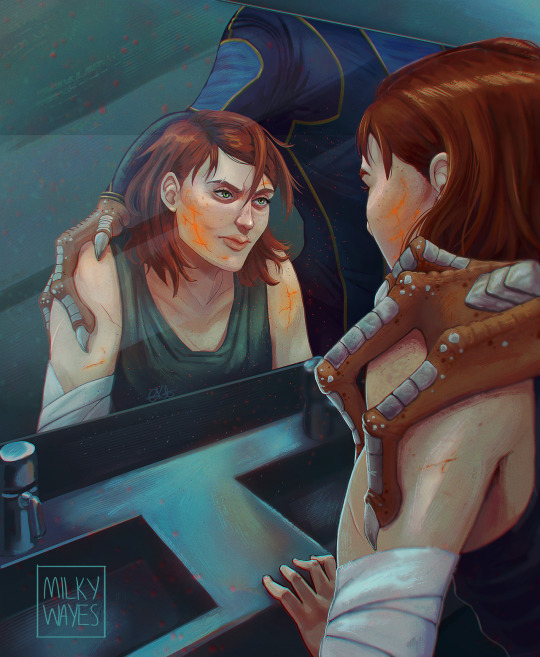
battlefields, internal
#mass effect#mass effect fanart#commander shepard#femshep#shakarian#shepard x garrus#mass effect 3#mass effect trilogy#art#artists on tumblr#video games#illustration#milkyart#this kicked my ass#hers too. but someone's got her six#man this is just the entirety of their ME3 dynamic to me I am Gnawing on it.#dropped barriers. skin to skin. she wrangles the galaxy - and herself - and he quietly makes sure she lives to keep on fighting#both physically and emotionally.#partners...#no shepard without vakarian dot png!!!#should've named it that instead of 'mirror' lol
843 notes
·
View notes
Text
MAN I'm seriously so sad about season 2. Bc I wish act 2 had the same emotional impact on me as it appears to have on so many others. But rn I'm just somewhere between unable to care and actively annoyed by some of those writing decisions. Seriously the more I think about it the less I like it.
#act 3 come through please 🙏#I don't think it can salvage some of the things I have contentions with but still... please...#don't ask me about the silco vander flashback with jinxs + vis mom#or the bizzare choice to do so much of the storytelling through this weird music video format they've got going on#completely stripping it of the weight these plot beats could've had if they were... normal scenes#and also missing the point of how the music was used in season 1 and what made it so effective#bc it was complementary to instead of replacing the storytelling#seriously don't ask me about these things I will spontaneously implode on the spot#whyyyyy would they recontextualize season 1 like this with that flashback#to me it kind of ruins the character dynamics and themes in s1. it just makes me so sad you have no idea#also what even are they doing with Jinx rn for real#aaarghhhh just... so many things that are making me scratch my head#also I'm so terribly sorry but I could not care less about Isha sorry lol#like i get that its sad conceptually but she was such a non-character that i struggle to feel impacted at all#same with sky tbh. i thought her role in s1 was alright but there is so much emotional weight put on her now#in terms of her relationship to Viktor but that was barely established so it's weird to have her around#and clearly you're supposed to care but they haven't given me much reason to#isha and sky were non-characters just there to die to further the development of other characters#they didn't really have anything going on on their own and that's just a type of character and plot device that does nothing for me#also i thought the war between zaun and piltover + internal struggles in zaun bc silcos gone would be the main focus#but that stuff seems so sidetracked rn#also sorry i dont like what they did with vander and warwick either. that man should've stayed dead lol#it honestly just makes his death feel less impactful and i dont know what this is supposed to do for the story or the themes???#that just feels like a pointless plotline that is taking up time that could've been spent on other things#i just... i could go on like this for a while like there are so many things that just puzzle me#it's so weird considering how tight and thematically consistent season 1 was#let's see where act 3 goes but... i kinda have a bad feeling about it ngl#obv im glad others are enjoying it and this is just my opinion! also a lot of this are probs just my personal tastes anyway#arcane spoilers
36 notes
·
View notes
Text
idk man i like it when characters break up and remain in each other’s lives. i like it when the romance was good for them at one point, and stopped working because they changed and grew, and they’re mature enough to realize that. i like it when a break-up starts messy but ends with them coming back together again understanding each other better. i like it when characters drop the romance between them but are still comfortable platonically and/or sexually. that’s fun, i don’t know why you’d pretend that’s a lesser form of enjoying a character dynamic than them ending up together forever.
#one of the best bits of the mass effect trilogy btw is that i can play this out in-game and its my favorite option#i like romancing kaidan as femshep in me1 and i think they’re good for each other romantically! in me1.#but after shepard’s death they’re two very different people and i like the idea that those people aren’t compatible romantically like she#is with someone else. (and im a shakarian enjoyer so i especially love the contrast that gives to her relationship with garrus becoming#romantic only post me1 because that’s the point at which they’re more compatible like that. where garrus is less her subordinate but someone#who has been in her shoes and made the choices she has and suffered similar losses. mass effect is a good video game.)#anyway. point is that’s my favorite route to play it because you and kaidan breaking up doesn’t make you any less friends and teammates in#me3! i like that! important to me!#its a good dynamic u guys should try more of it
11 notes
·
View notes
Text
I wanna pick up a girl and pin her against a wall and give her lots of lil smooches while we giggle like the little gay goblin gremlins that we are
#thoughts#oni talks#sapphic yearning#oni has a crush#not really targeted but idk I wish I was buff so bad bro#the lesbian short person madness is getting to me I think#I want to bridal carry the love of my life plz thank#why workout why no just be buff lesbian already :(#also to be able to do those dramatic ass romantic dips during dancing#want the gorl to know I am stronq reliable and will never drop her (unless she wants me to in a safe manner)#this is why I fucking love water I get to be as buff as I want I can carry gorl no problem I can carry anybody in water I can be buff as fuc#I do also wish my arms were bigger so I could more effectively wrap them around people sometimes but that’s separate#maybe it’s just coz I had more alcohol than normal today but the YEARNING IS GETTING TO ME YALL#I wanna write lesbian music again so bad I wanna shoot gay little music videos with my paramour#sleeby bedtime where we read each other sapphic stories as they fall asleep in my lap or give versa or smth#but also girls in lap!!!! so perfect 1000/10 also just I wanna be buff so baddddddd#ship dynamics#idk if it counts but I feel like someone could make ship art with these ideas so sure#I wanna be good at dancing so I can be like a little lesbian doing the rose thing in the most dramatically gay way possible#I’m gonna be a Gay lil cowboy tomorrow for pride and the urge to dramatically tip my hat in lesbian is gonna be so strong
13 notes
·
View notes
Text
I will always be in favor of playersexuality. Until the day game designers have more nuanced understandings of sexuality.
Game designers still only understand flamboyant gay, mean lesbian, slutty bisexual, and quirky queer. Any identities not those are not even recognized. And any complex characterizations are only afforded to "normal" straight characters.
While Larian gave us a step in the right direction, they are still coming from the above framework and trying to reiterate upon that. And you have to understand that framework in order to recognize why their implementation is still somewhat shallow while still being the best offered compared to other games in the genre.
In the past, every time I encountered a woman in a romanceable video game who correctly represents my own experience of bisexual/pansexual identity, she was only romanceable by male characters.
These are women who have tough exteriors on a spectrum of "bitchy femme", a midpoint of "aloof androgynous", to "tough masc". All points that are gnc in some way, but all are women who also have a soft interior that is interpreted as conventionally feminine.
Game designers interpret these two traits (outward gnc and inner softness) as a nullification to heterosexual woman. Time and time again. Falling into the stereotype of being a woman for a man to tame.
Will they ever understand? Or do people as a whole just don't understand the many ways bisexuality can take shape?
#back in EA people were wanting exclusive sexualities for the characters#and while Lae in particular is perfect as a pan character#i think if larian made exclusive sexualities for the companions#they would have made her straight despite gith pansexuality#there is so much in her writing that skews into a heterosexual framework#where dominating her is a viable path in her romance#a less het framework can still play with the need for protection and the arousal of anothers strength#as providing her a space for feeling strong and supported while feeling “weak”#while still getting off and feeling safe not always “being on top” in w/e manner that entails#but in game its still laced with a power dynamic/conquering/taming framework rather than emotional safety in vulnerability#playersexuality#video games#i will never forgive bioware for this phenomenon#over and over#every one of their games has this character#i will always download mods making these women bi#kotor bastilla#kotor atris#kotor handmaiden#mass effect cora#dragon age aveline#dragon age cassandra#mixing fandoms#forever mad about cassandra pentaghast#text#my think pieces
19 notes
·
View notes
Text

Some human (or organic being) and robot dynamics I enjoy.
#EDI#Mass Effect EDI#joker mass effect#jeff moreau#Glyph Mass Effect#liara t'soni#Art#Mass Effect#mass effect trilogy#random stuff#My original inspiration was my Guardian and her Ghost#But then I realised the second dynamic applied to Liara and Glyph#video games
3 notes
·
View notes
Text
I called it, Ruan Mei is deranged and shady as hell
#I love her#I also said that she the light cone and the light cone description and her last eidolon and some other things#made her feel almost nonexistent or barely there‚ but not in a Herta and Xueyi kind of way#And it seems I was right too? That line‚ 'Life is so colourful‚ but... it has nothing to do with me' reads to me like that for now#Really digging the way Dr. Ratio contrasts or parallels her. How she talks about keeping a serene mask until the situation is ascertained#and talking about emotions and feelings being able to be analysed and dissected‚ the root of which found#In the promotional video immediately after she says the thing about masks‚ Ratio appears talking precisely about the same thing#It's so cool how both also take advantage in their fighting style of the weaknesses of the enemies#Ruan Mei with the weakness break effect and Ratio with the debuffs#Ruan Mei didn't seem as scornful of Ratio and the Guild as Herta seemed but Ruan Mei is also less open#The leaked line of Ratio about her (I can't recall exactly but it wasn't anything we haven't seen in the new Ruan Mei short‚#something about how the true intentions of her research are not what she stated and that she is actually the most ambitious member#of the Genius Society)‚ while not truly negative‚ doesn't seem positive either. But he perhaps isn't as callous#as he is when he talks about Herta and Screwllum. Or perhaps he is being even more so#I'm looking forwards to their interactions and the development of the relationship between the Guild and the Society as a whole#But also the dynamics and problems inside the Genius Society itself#They all seem to have their all personal and selfish agenda which could be source of clash‚ whereas the Guild seems more people driven#Even if they have at times pretty ugly methods. Not they the Genius Society doesn't#Ajfjsjd anyway I wonder if the Ratio and Ruan Mei parallels and contrasts will be truly explored or if it will be left in the air#just to sell either character more#But it seems sooo intriguing and so shady and I'm so into how two faces or representation of the same Aeon or under the same drive#could approach a similarish issue. Or how could one view the other. And how in general all that will develop#I've been looking forwards to more insight on the Guild/Genius Society confrontation since very early on haha#I am loving Ruan Mei *sighs* deranged#I talk too much
14 notes
·
View notes
Text
meta videogame bullshit my beloved
#that's a positive bullshit.#4th wall breaking. acknowledgement of game mechanics by the characters/story. character awareness that they're IN a story.#most of that can be in other stories too but i LOVE how it's handled in video games the most#it happening in a video game where YOU have control over things and things can be dynamic is just so much more effective.#the fact that it's a game shaping the world and how it works...#you can't really get that from a movie or a book! it's too static! there's only so much exploration of the medium possible!!#this tangent is brought to you by uhhh. me doing something in this game#and going OH GOD THAT WAS THE WRONG OPTION#then just. putting my switch into emergency sleep mode and sitting it to the side and now i'm here#haha it's fine!!! :)#like legitimately it is i am just at the point in this game where it's making me get up and pace around like every 2 minutes.#which is an accomplishment! but also makes it difficult to uh. actually play the game.#*new creative post tag here*#sorry for making 95% of this post be in the tags that's the point of tumblr tho yknow.
2 notes
·
View notes
Text
youtube
Mastering Animation in Green Screen by DoInk Tutorial
Welcome to an exciting journey into the world of animation with Green Screen by DoInk! In this step-by-step tutorial, we'll guide you through the art of animating in the app, unlocking the creative possibilities to make your projects come alive.
#Green Screen by DoInk#Animation Tutorial#Animated Drawings#Keyframing Techniques#Layered Animation#Creative Animation Tips#Dynamic Video Effects#Elevate Your Video Projects#Visual Storytelling with Animation#Green Screen Animation Mastery#doink#do ink#greenscreen#green screen#doinktutorials#green screen tips#video editing apps#Youtube
0 notes
Text

garrus and his blackwatch goons from ->dreamt a cipher
#mass effect#mass effect fanart#turians#garrus vakarian#alien#art#digital art#video games#artists on tumblr#mass effect garrus#turian OC#milkyart#cipher tag#fanart for my own fic take two#ms [redacted] stop smirking you're scaring the mammals#there's group dynamics happening. if you even care#a group of blackwatch turians is also called a ‘murder’ fyi
505 notes
·
View notes
Text
🌟 Ready to master your choices in "Until Dawn"? 🌌 Check out our new blog post where we explore Episode 02 and focus on Matt's tense encounters in the Washington Lodge. Every decision you make counts! 🦋
#Until Dawn#Until Dawn Choices#Matt Journey#Washington Lodge#Butterfly Effect#Interactive Horror Games#Game Choices#Video Game Storytelling#Gaming Narratives#Emotional Journey#Character Relationships#Choice Driven Games#Horror Game Analysis#Gamer Community#Gaming Tips#Game Strategy#Matt Choices#Episode Two#Choose Your Adventure#Drama In Games#Game Analysis#Video Game Choices#Horror Game Experience#Playthrough Guide#Game Emotions#Game Outcomes#Emotional Gameplay#Friendship Dynamics#Game Confrontations#Interactive Storytelling
1 note
·
View note
Text
Time to talk an unnecessary amount about floors!

Episode 6 of Dungeon Meshi was produced in collaboration with a smaller studio, Enishiya - and it went way harder than I expected, for being made up of two relatively simple and self contained stories focusing on one character each.

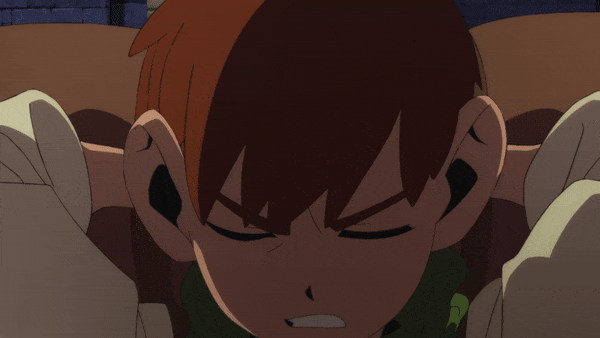
And you can really see how those extra resources meant the animators could give full focus to both halves of the episode. Let's take a look at one piece that stole the show.
The first half was handled primarily by episode director/storyboard artist Keita Nagahara and co-animation director Hirotoshi (or Hiroaki? [1]) Arai. It's actually kinda insane how much of this section can be attributed to these two.


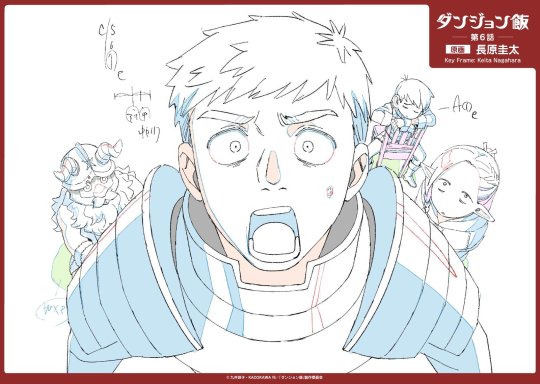
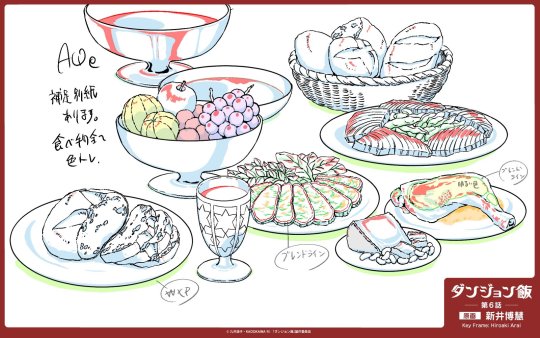
But the real star of the show is the second half, Chilchuck vs the mimic, led by co-animation director Toya Ooshima in his first animation director role for TV anime!
And the biggest aspect that knocked my dang boots off was something that's very consistent with Ooshima's style: background animation!
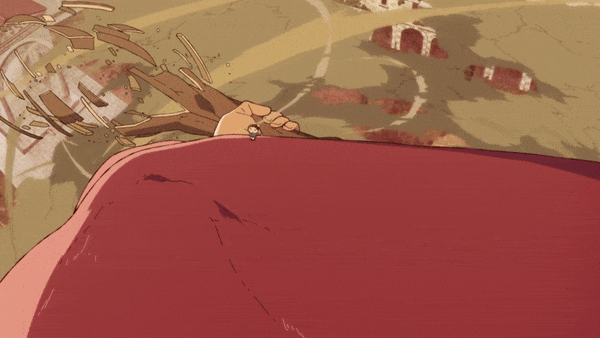
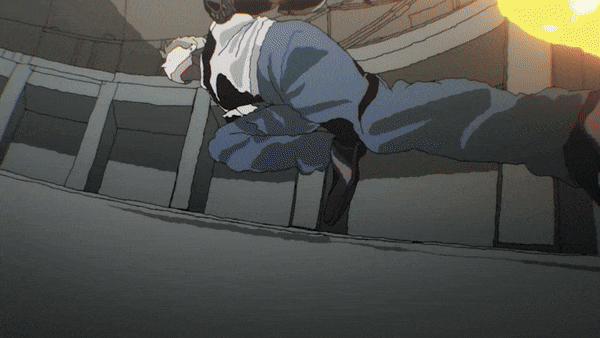

By animating the backgrounds rather than using painted still images, Ooshima and the team of other similarly skilled animators are able to create these beautiful dynamic camera movements that wouldn't be possible otherwise. Like these cuts by Takeshi Maenami where the camera becomes an expressive part of the scene, zipping forward and backward, and tilting to emphasize the speed of this murderous hermit crab. (Maenami's style is also very recognizable here - snappy timing and quick camera movements)


Or this cut by the incredible Kaito Tomioka which cleverly combines a traditional background for the walls with a fully animated floor. The level of detail in these tiles is just completely insane, and used to great effect with this wide, diagonal angle, and the way the camera tentatively drifts forward before reversing direction, and the tiles blur out as it speeds up.


I don't think I'm the only one caught off guard by how much they full-assed this little side story, but it was a pleasant surprise!
I broke down the entire episode in this video here. A lot of research went into this one, and I think it's the best one of these videos I've made so far, so if you're at all interested in more of this type of analysis in video form, I would really appreciate it if you checked it out, or re-blogged this post! Thanks
youtube
[1] It's listed as Hirotoshi on Anime News Network, but Hiroaki on a key frame that Studio Trigger shared on Twitter, so I'm not sure which one is wrong.
#dungeon meshi#animation analysis#studio trigger#laios touden#chilchuck#video#original#mini essay#Youtube
17K notes
·
View notes
Text
Unlock IK Multimedia's MixBox SE for Free: A Limited-Time Offer
Get your hands on the versatile MixBox SE multi-effect plugin by IK Multimedia, available at no cost for a limited time, courtesy of Audio Plugin Deals. As February unfolds, don’t miss out on this opportunity to enhance your audio toolkit with a selection of free plugins. IK Multimedia’s MixBox SE for Free IK Multimedia, in collaboration with Audio Plugin Deals, is giving away the MixBox SE…

View On WordPress
#24 modular effects#Apple Silicon#Audio Plugin Deals#Audio Unit#British Dynamics#DAW#Free#IK Multimedia#IK Multimedia MixBox SE#Linux#MAc#MixBox SE#plugin#video#VST#Windows#YouTube
0 notes
Text
just watched the new aquaman movie and its just okay
#nothing great but its alright i guess#why was the cgi horrible tho??? like it was so bad#i get like... colour contrasting and stuff.... but why was his suit THAT bright#ugly as shit#and the movements of them atlantean animals... what#and i swear some scenes had so much effects in em it looked straight out of a video game#like... fifa audience type graphic#the storyline was kinda goofy and bad imo too#BUT!!!!! the arthur and orm thing made me feel so good inside#i love their dynamic SOOOOO MUCH#SOOOOOO SOOOOO SOOO MUCH#arthurs playfulness rubbing off on orm... fnrbrb gahhh i love it#the scenes in the jungle were so funny#literally older brother bullying their younger sibling its so silly#text
0 notes
Text
Product design and psychology: Psycho manipulation techniques in gaming
Keywords: Product Design, Gaming, Psychological Manipulation Techniques, Player Behaviour, Player Engagement, Skinner Box Mechanics, Fear of Missing Out, (FOMO) Social Pressure, Sunk Cost Fallacy, Artificial Scarcity, Dynamic Difficulty Adjustment (DDA), Pay to Win, Teasing Future Content, Locus of Control, Grinding, Loot Boxes, Gacha Systems, Zeigarnik Effect, Genshin Impact, Ethics in Game Design, Addiction in Gaming, Excessive Spending, Unfair Gaming Environment, Ethical Game Design Practices, Responsibility of Designers and Developers

Abstract:
This paper explores the implementation of psychological manipulation techniques in product design, particularly in gaming, focusing on their effects on player behaviour and engagement. The discussed techniques include Skinner Box Mechanics, Fear of Missing Out (FOMO), Social Pressure, Sunk Cost Fallacy, Artificial Scarcity, Dynamic Difficulty Adjustment (DDA), Pay to Win, Teasing Future Content, Locus of Control, Grinding, Loot Boxes, Gacha Systems, and the Zeigarnik Effect. Real-world examples, such as the game "Genshin Impact", are used to illustrate the techniques' applications. While acknowledging these methods' effectiveness in increasing player engagement and revenue, the paper raises concerns about their potential to foster addiction, promote excessive spending, and create unfair gaming environments. The study calls for ethical game design practices and highlights the designers and developers' responsibility in maintaining a balanced and fair gaming experience.
Introduction
Psychological manipulation techniques have been employed in various aspects of human life, from interpersonal relationships to marketing and advertising. Understanding these techniques can shed light on how consumer behaviour is shaped, how decisions are influenced, and how interactions are guided. In product design, these methods play a critical role, often subtly, in guiding user experience, driving engagement, and encouraging specific user actions. The gaming industry, in particular, has become adept at employing these techniques to create compelling and immersive experiences.
However, the application of psychological manipulation techniques in product design is not without controversy. Moral and ethical concerns often arise, particularly when these tactics are used in ways that can lead to addictive behaviours or unnecessary expenditure. The impact of these techniques on the mental health and wellbeing of users is a subject of ongoing discussion in both academia and the industry.
To comprehend the dynamics of these manipulation techniques, this paper delves into eleven of them, as applied in game design, with a focus on their influence on player behaviour and engagement. Importantly, each technique will be viewed from both a product design and psychological standpoint to ensure a comprehensive understanding of its implementation and implications.
The Techniques
1. Skinner Box Mechanics
In the world of behavioural psychology, the Skinner Box, developed by B.F. Skinner, plays a pivotal role. This mechanism revolves around the concept of operant conditioning, where subjects learn to associate behaviours, such as pressing a lever, with receiving rewards. Game designers have translated this concept into their work by prompting players to perform simple tasks, followed by randomized rewards, thereby creating a compulsive loop of behaviour.
This is evident in various mobile and free-to-play games, where completion of tasks results in rewards such as virtual currency, points, or character enhancements. However, the randomness of the reward sequence can lead to a compulsive cycle where players continue to perform tasks in anticipation of a potentially more substantial reward next time - an aspect that can become addictive.
2. Fear of Missing Out (FOMO)
The phenomenon of FOMO plays a critical role in player engagement strategies in games. Time-limited events or offers with exclusive content available only for a short duration can induce a sense of urgency and scarcity. This pressure can propel players to participate or make purchases for fear of missing out on the exclusive content.
For instance, games often introduce special holiday events or weekend sales offering exclusive items or characters. By time-limiting these events, they can stimulate a sense of scarcity and urgency, urging players to spend more time in the game or make additional purchases.
3. Social Pressure
Social dynamics are influential factors in the gaming experience, particularly within multiplayer environments. Social pressure can push players to spend on cosmetic items to maintain status within a group or use social connections to encourage continuous engagement with the game. For example, games often offer bonuses for inviting friends to join or rewarding cooperative play to capitalize on the innate human desire for social connection.
However, the potential downside of this manipulation technique lies in the pressure it may create among players to conform to group norms or expectations, potentially leading to unnecessary spending or extended playtime.
4. Sunk Cost Fallacy
The sunk cost fallacy has a profound impact on player behaviour. As players invest more time, effort, and money into a game, they are more likely to continue playing to justify their initial investment. This can be the case even if the player's enjoyment of the game decreases over time.
This phenomenon can be problematic, particularly when it encourages players to spend more money or time on a game they no longer find fulfilling, leading to potential addiction or excessive spending.
5. Artificial Scarcity
Game designers often use artificial scarcity to increase the perceived value of in-game items or characters. By limiting the availability of certain items, an illusion of scarcity is created, leading players to spend more resources to acquire them. This can have a significant impact on player behaviour, driving players to play longer hours or make additional purchases to secure these scarce resources.
While this strategy can enhance player engagement and revenue, it also raises ethical concerns about encouraging excessive spending.
6. Dynamic Difficulty Adjustment (DDA)
Dynamic Difficulty Adjustment is a technique that tailors the game's difficulty level based on the player's skill. Transparent application of DDA can enhance player engagement by providing a suitable level of challenge. However, when used non-transparently, it can be seen as manipulative, as it can be used to encourage additional spending.
For instance, making a game temporarily more challenging might push players towards purchasing power-ups or additional resources. This manipulation can create an unbalanced gaming experience, leading to questions about its fairness and ethics.
7. Pay to Win
The 'Pay to Win' model is prevalent in many games, allowing players to purchase items or upgrades that provide a significant advantage in gameplay. While this can help generate revenue for the game, it creates an uneven playing field favouring those who spend more money.
This model raises serious ethical concerns about creating an unfair gaming environment and promoting excessive spending.
8. Teasing Future Content
Teasing future content can be an effective strategy for keeping players engaged and looking forward to new additions. By giving sneak peeks of upcoming features or content, games can retain player interest, even if they may be losing interest in the current content.
However, it's important to consider the potential disappointment and loss of trust that could occur if teased content does not live up to player expectations.
9. Locus of Control
A player's sense of control over the game's environment, narrative, or outcomes can significantly enhance their engagement and immersion. By fostering a sense of agency, game designers can captivate players, keeping them invested in the game world.
However, providing an illusion of control, where the actual impact of player decisions is minimal, can lead to player frustration and dissatisfaction.
10. Grinding
Grinding, or repeating tasks for incremental gain, is common in many games, particularly in Massively Multiplayer Online Role-Playing Games (MMORPGs). The player's progress is often determined by their character's level, skills, and equipment, which are typically improved through grinding.
While grinding can provide a sense of progress and achievement, it can also lead to fatigue or boredom if not carefully balanced with other gameplay elements.
11. Loot Boxes
Loot boxes, containing a random assortment of in-game items, have become a popular mechanism in game design. They can provide excitement and unpredictability, enhancing the gameplay experience.
However, loot boxes have come under criticism due to their similarity to gambling, raising concerns about fostering addictive behaviours and encouraging excessive spending.
12. Mechanisms of Gacha
The Gacha system, named after Japanese toy vending machines, has become a pervasive strategy within the gaming industry. It operates on a 'loot box' principle, where players pay for the chance to obtain a randomized item of varying rarity. This mechanic is psychologically intriguing, as it taps into the human predilection for chance-based rewards, thereby playing a crucial role in player retention and revenue generation. The intermittent and unpredictable nature of rewards in Gacha systems makes them akin to Skinner's variable-ratio schedule, which is known to produce high rates of response, even in the absence of rewards.
This forms the psychological bedrock of Gacha systems' addictiveness. The thrill of obtaining a rare, powerful character is essentially gambling, which is inherently addictive. Similarly, in "Genshin Impact," players can acquire weapons or characters using Primo gems (the game's currency), resulting in variable outcomes.
13. Zeigarnik Effect
The Zeigarnik effect, originally studied by Russian psychologist Bluma Zeigarnik in the 1920s, postulates that people tend to remember unfinished tasks better than they recall completed ones. The present study explores the Zeigarnik effect from two key perspectives: psychological and product design. Through the detailed analysis of real-world examples and case studies, this paper aims to provide insights into how product designers can harness the Zeigarnik effect to create more compelling, engaging, and user-friendly products.
In the realm of product design, the Zeigarnik effect can be employed to increase user engagement and retention. One of the primary ways is by creating a sense of incompletion that motivates users to return to a product or service.
The gaming industry is a prime example where the Zeigarnik effect is utilized. Games like Candy Crush keep players engaged by offering multiple levels that create a sense of unfinished business. The constant reminder of the pending level increases the likelihood of the user returning to complete the game.
14. Genshin Impact
In the pantheon of modern digital entertainment, 'Genshin Impact' has established itself as a monumental exemplar of the gamic medium's potential. Developed by the Chinese company miHoYo, the game has found global resonance since its release in 2020. The focus of this article is to scientifically dissect the integral components of 'Genshin Impact', emphasizing its gameplay, narrative, technological elements, and its influence on socio-economic aspects.
From a ludo logical perspective, 'Genshin Impact' showcases an amalgamation of game mechanics and systems, providing an extensive interaction spectrum for its players. As an action role-playing game (RPG), it encapsulates various interaction modalities including combat, exploration, puzzle-solving, and character development. The game's combat system relies on a character-switching mechanism that promotes strategic combination of different character abilities, while its progression system encourages continual exploration of the game's vast world.
The incorporation of 'gacha' mechanics, where players can obtain random virtual items or characters, illustrates the application of probability theory and the role of randomness in player motivation. It taps into the psychological principle of intermittent reinforcement, incentivizing continuous engagement through the thrill of uncertain rewards.
Conclusion
While the psychological manipulation techniques employed in game design can effectively enhance player engagement and generate revenue, they also pose potential risks. Fostering addictive behaviours, encouraging excessive spending, and creating unfair environments are significant concerns.
Understanding these techniques, their implementation, and their implications can inform ethical game design practices. It can also stimulate critical conversations about the role of psychological manipulation in product design and the responsibilities that designers and developers bear in ensuring a balanced and fair gaming experience. It's essential that the gaming industry continually assesses these techniques' ethical implications to provide enjoyable, immersive, and ethical gaming experiences.
References:
Fogg, B. J. (2009). A behavior model for persuasive design. Proceedings of the 4th International Conference on Persuasive Technology - Persuasive '09. doi:10.1145/1541948.1541999.
Skinner, B. F. (1938). The Behavior of organisms: An experimental analysis. New York: Appleton-Century-Crofts.
Przybylski, A. K., Murayama, K., DeHaan, C. R., & Gladwell, V. (2013). Motivational, emotional, and behavioral correlates of fear of missing out. Computers in Human Behavior, 29(4), 1841-1848.
Cialdini, R. B. (2006). Influence: The psychology of persuasion. New York, NY: Harper Collins.
Arkes, H. R., & Blumer, C. (1985). The Psychology of Sunk Cost. Organizational Behavior and Human Decision Processes, 35(1), 124-140.
Zagal, J. P., & Deterding, S. (2018). Modes of Play: A Frame Analytic Account of Video Game Play. Games and Culture, 13(8), 854–877.
Hunicke, R., LeBlanc, M., & Zubek, R. (2004). MDA: A formal approach to game design and game research. Proceedings of the AAAI Workshop on Challenges in Game AI.
Consalvo, M. (2009). Cheating: Gaining Advantage in Videogames. Cambridge, MA: MIT Press.
Walz, S. P. (2010). Toward a Ludic Architecture: The Space of Play and Games. ETC Press.
Deci, E. L., & Ryan, R. M. (2000). The "What" and "Why" of Goal Pursuits: Human Needs and the Self-Determination of Behavior. Psychological Inquiry, 11(4), 227-268.
King, D., Delfabbro, P., & Griffiths, M. (2011). The convergence of gambling and digital media: Implications for gambling in young people. Journal of Gambling Studies, 27(2), 193-213.
Hamari, J., Alha, K., Järvelä, S., Kivikangas, J. M., Koivisto, J., & Paavilainen, J. (2017). Why do players buy in-game content? An empirical study on concrete purchase motivations. Computers in Human Behavior, 68, 538-546.
Zeigarnik, B. (1927). Das Behalten erledigter und unerledigter Handlungen. Psychologische Forschung, 9, 1-85.
Hu, J., Gao, H., & Wang, Q. (2017). Examining digital cheating in video games from a moral perspective. Ethics and Information Technology, 19(4), 243–255.
Griffiths, M. D., & Nuyens, F. (2017). An overview of structural characteristics in problematic video game playing. Current Addiction Reports, 4(3), 272-283.
Paulus, F. W., Ohmann, S., von Gontard, A., & Popow, C. (2018). Internet gaming disorder in children and adolescents: A systematic review. Developmental Medicine & Child Neurology, 60(7), 645-659.
Zhu, J., & Zhang, W. (2019). Arising of the ethical issues in the digital era of game industry. International Journal of Technology and Human Interaction, 15(1), 1-18.
#ux#ux desgin#psychological manipulation#game design#product design#video games#skinner box#FOMO#loot box#sunk cost fallacy#pay to win#social pressure#dynamic difficulty adjastment#grinding#locus of control#teasing future content#gacha mechanism#zeigarnik effect#genshin impact#artificial scarcity
1 note
·
View note